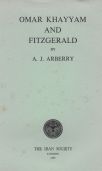‘Let the Credit Go’: Coleridge, Edward FitzGerald, and Literary Custody. Erik Gray.
Coleridge Bulletin: The Journal of the Friends of Coleridge (1999) (Autumn), p. 47-52.
Edward FitzGerald seems to have been thinking of Coleridge while translating the Rubáiyát. In a letter of May, 1857, about a year after he had been introduced to the poem, FitzGerald gives the first evidence that he has been translating it into verse. Only a single quatrain is translated, and that not into English, but into Latin; FitzGerald writes, “I could not help running into such bad Latin,” which, he says, “is to be read as Monkish Latin.”
